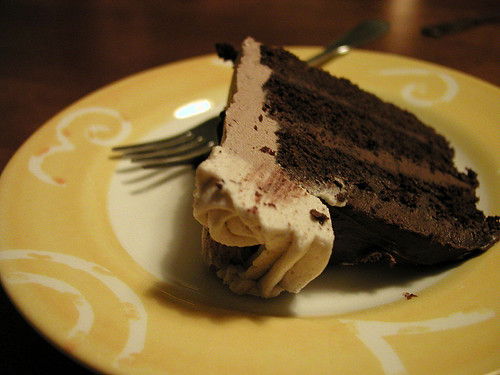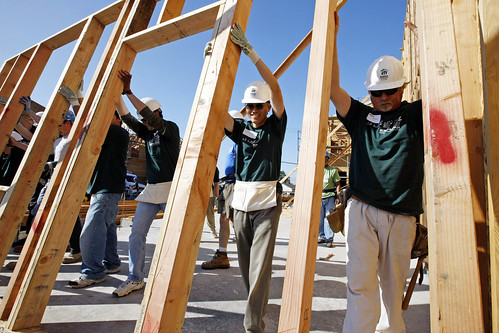Solemnity of The Most Holy Body and Blood of Christ (C)
Picture: cc sharyn morrow
My dear friends, do you like cake? If I were to offer you a slice of cake right now, would you eat it? I guess you would, if you like it. And you won’t if you don’t. Or if you happen to be watching your weight. But what if it’s a birthday cake? And what if it’s meant for a close friend or relative? And what if this friend or relative is turning 21? Or 60? Or 80? What would you do then?
I’m not sure, but I think that, in such situations, many of us would not refuse the cake. Not even if we were on a diet. We may ask for a smaller slice. But we’ll try our best to eat it. And we all understand why, don’t we? We know that it’s not really about the cake. We eat it, even if we don’t like it, because the cake connects us with the celebration. And the celebration connects us with the person whose life we are celebrating. The more the person means to us, the more we try our best to eat the cake. Even if we don’t particularly like it.
I wonder if something like this is not true also of Corpus Christi. The most holy Body and Blood of Christ. By which we usually mean the eucharistic bread and wine. We may or may not like the taste of bread. But we still eat it. And not only do we eat it, we take it to the sick and housebound. We expose it for adoration. And, as we will do later this evening, we even carry it in solemn procession. Why? Every good Catholic knows the answer. Or at least we think we do. It’s because we believe that what we eat and share, what we adore and carry in procession, is more than just a piece of bread. It is the Real Presence of Christ himself. The Word of God made flesh for all our sakes.
But is it really enough for us simply to believe this? Or to think that we do? What would you say, for example, of someone who goes to Mass everyday, and who spends hours in the adoration room, but who regularly abuses the domestic help? Or neglects the spouse or the children? Or backstabs colleagues at work? Wouldn’t this be the equivalent of someone who eats the birthday cake, and then promptly picks a fight with the celebrant? Clearly, such a person hasn’t quite understood the true meaning of the eating. Has not made the connection between the cake and the celebration. And between the celebration and the life being celebrated.
Which is why our Mass readings are so helpful. The first reading reminds us of the connection between the bread and wine and the celebration that gives them their meaning. The background to the story is that Abraham has just won a big victory in battle. And Melchizedek, the king of Salem, offers Abraham bread and wine, along with a prayer of blessing, as a congratulatory gift. A celebration of Abraham’s triumph in battle. Blessed be God Most High for handing over your enemies to you. The bread and wine are part of a victory celebration.
Which is true also of the eucharistic bread and wine. They too are part of a celebration of victory. Christ’s victory over sin and death. And just as the birthday cake has meaning only when connected with the birthday celebration. So too does the eucharistic bread have meaning only when connected to the eucharistic celebration. Which is why it’s quite nonsensical for anyone to spend hours in the adoration room communing with the Lord. But then refuse to go to Mass. Perhaps because he or she finds all the other people at Mass too distracting. Or irreverent. Or sinful. The bread has meaning only when connected to the celebration. And those who participate in it.
Nor is the celebration itself meant to stand alone. It too needs to be further connected. This is what the other readings help us to do. In the second reading, St. Paul recalls for us the words that Jesus used at the Last Supper. Do this as a memorial of me. In other words, eat the bread. Drink the wine. Celebrate the eucharist. Not for their own sake. But in order to remember me. To remember who I am. And what I’ve done. For you. And in the remembering and the celebrating, in the eating and the drinking, proclaim my self-sacrificing love to the world. For until the Lord comes every time you eat this bread and drink this cup, you are proclaiming his death.
There is even more. The celebration is not just a memorial and a proclamation. It is also a feeding and a nourishing. A strengthening and a sustaining. Isn’t this what the gospel story reminds us. After having taught and ministered to the people, instead of sending them away, Jesus arranges for them to be fed. And he does it through four eucharistic actions. He takes, he blesses, he breaks and he gives. And in the taking and blessing, in the breaking and giving, the people receive far more than they need for their sustenance. For when the leftovers are collected they fill twelve baskets.
And it may be helpful for us to wonder what exactly happened to all those scraps. What do you think? Isn’t it reasonable to expect that they were taken away by those who had already been fed? And shared with those who were still hungry for food? This is, of course, not unlike what our communion ministers are commissioned to do. To distribute the eucharistic bread not just to the congregation at Mass, but also to those who, for one reason or another, are unable to join us at the Table of the Lord.
But it’s not just the communion ministers who have this responsibility. All of us are somehow called to do the same. Even if we may not bring the sacred host to others, we all have the responsibility to go forth from this eucharistic celebration to live eucharistic lives. To allow ourselves to be taken and blessed, to be broken and shared. So that a hungry world might be fed.
The eucharistic bread has meaning only when connected to the eucharistic celebration. And the eucharistic celebration has meaning only when connected to eucharistic lives. First of all, the life of Christ. And then, the lives of his disciples. Of all of us. Of you and of me. This is the awesome Mystery that we gather to celebrate today. This is the deeper meaning of Corpus Christi. This is what we are called to share with the rest of our world. This is the precious bread that we are all given to eat and to adore. To savour and to share. Especially with those whose lives may seem to contain nothing worth celebrating.
My dear sisters and brothers, at Corpus Christi, something like a delicious birthday cake is given to us to enjoy. What must we do to enter more deeply into the celebration? And to share more fully in the life it offers us today?


